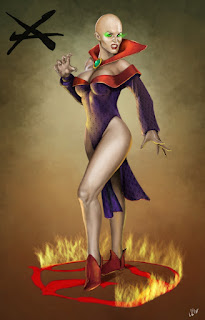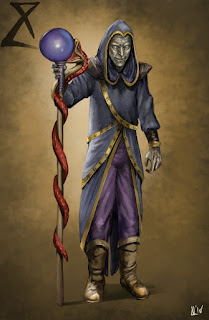Making Characters Weird: Magic-Users/Wizards
 |
| Azimuth the Planar by JLazarusEB is licensed by CC BY-NC-ND 3.0 |
What's included in this post?
- A quick background on my "weird characters" series of posts
- A short history of the magic-user ("wizard") class in Dungeons & Dragons through the editions (to help with terminology/definitions)
- Three things to consider when playing a magic-using character
- A table of 20 "weird" (non-traditional) traits for magic-using characters
- What's next in my "weird" series
- Appearance. Most magic-users go through years of study and apprenticeship before they become adventurers. Do you look like a classic wizard, elderly, with gray or white hair and (if male) a beard? Is your hair wild and unkempt? Or, do you buck these trends?
- Manifestations. What are some unique things that happen when you cast your magical spells? As an example, maybe each time you cast a spell, the temperature around you drops by 10 degrees for a few hours. Perhaps a haze of colored vapor appears, or the air smells of cinnamon.
- Background/History. How did you learn magic? Were you born with talent, did you somehow teach yourself, or did you have a master? If you have a master, what was he or she like? (See the tables below for a few ideas on unique wizard masters).
- Arcane Artisan, Arcane Investigator, and Sage (Expert/Specialist Subclasses)
- Hedge Wizard and Witch (Wilderness Subclasses)
- Mesmerist (City/Urban Subclasses)
- Sea Witch (Naval/Sea Subclasses)
- Mad Scholar and Necromancer (Horror Subclasses)
- Evil Queen and Wizened Mentor (Fairytale Subclasses)
- Cunning Mentalist and Merciless Ruler (Sword & Planet Subclasses)
- Chemist and Mastermind (Criminal Subclasses)
- Koldun and Charodey (Russian/Slavic Folklore Subclasses)
|
Roll |
Weird Trait |
|
1 |
Magic Is Dying: Magic is
a dying resource. Most remaining magic is contained within magic creatures.
The creature’s head retains the magic when severed from the body & can be
used in place of components to cast spells. The head will constantly complain
about this state of affairs. It can also be stolen. |
|
2 |
Unique Spell Book: Instead
of a traditional spell book or scrolls, you use one of the following (Roll 1D8): |
|
|
1: A collection of homemade dolls, each representing a different
spell. 2: A quipus (aka “talking knots”); colored, spun, and waxed threads.
3: Bag of the Nine Fiends. 4: Drawings on animal skins. 5: Fragile papyrus. 6: Medicine pouch. 7: Mystical tattoos. 8: Colored scarves. |
|
3 |
Arcane Source: Your
source of arcane power comes from (Roll 1D8): |
|
|
1: Ancient ley lines. 2: Residue from an ancient magical apocalypse. 3: Astrological phenomena. 4: Sacred numbers. 5: The void. 6: Dreams. 7: Bits of debris from an asteroid that crashed millennia ago. 8: Collective memory. |
|
4 |
Animal Components: The
material components of every spell you cast consist of parts of dead animals
(feathers, fur, bones, tails, and/or other unsavory parts such as organs).
You’ve been caught once or twice collecting them. Most people think it’s
gross. It’s the ones who don’t mind that you should be wary of. |
|
5 |
Casting Focus: You cast
your spells by using (Roll 1D8): |
|
|
1: Rare spices. 2: Mirrors. 3: Different color smoke. 4: Dice. 5: Cards. 6: Dried insects. 7: Rare coins. 8: Un-meltable frost from the polar ice caps. |
|
6 |
Strange Component Pouch: Every
time you reach into your spell component pouch, there are new items you
didn’t place there. Roll 1D10. On a 1-9, it’s a random mundane item
(multi-colored bits of string, a braid of hair, playing cards with unknown
symbols, keys, dried food, etc.). On a 10, roll a 1D8: |
|
|
1: Small carved figures of the magic-user’s party members, but they
are missing the eyes. 2: A jar of giant bee honey. 3: Letters from descendants of the magic-user who haven’t been born
yet. 4: The dagger used when the first elf slayed another elf. 5: A glowing space rock. 6: A manticore hairball. 7: An answer to a sphinx’s riddle, but written in a forgotten
language. 8: An entire galaxy, shrunk to miniature size, inside a jewel. · Cross items off as they are discovered and replace with your own
ideas. |
|
7 |
Magic Guardians: Magic-users
are part of a corps of highly trained individuals from every corner of the
world. A Council of Guardians makes the rules on how magic should be used
properly and decides who gets to use magic. The Guardians are insufferable twits. |
|
8 |
Human Masters: Humans
discovered magic. Other races and creatures stole it. They’ll regret it one
day. |
|
9 |
Haunted: A
spell backfired when you were young and inexperienced, and someone died.
You’re convinced their soul is haunting you. It might be. It also might just
be your imagination. |
|
10 |
Memory Loss: After
your master taught you your first spell, you lost all your memories up until
that point. Your master claims that’s never happened before. |
|
11 |
Magic Gift: You
discovered a gift for magic after having been bitten by (Roll 1d4): |
|
|
1: A
plague rat. 2: A newborn with a full set of teeth. 3: A mysteriously glowing spider. 4: A two-headed dog. |
|
12 |
Magic Prodigy: You
have no memory of when or how you learned to cast magic, or where your spell
book came from. You just know how to read it and cast the spells it contains. |
|
13 |
Voice Inside Your Head: When you read spells out of your spell book, you
hear a voice that’s not yours inside your head reading the words. The voice
seems to be mispronouncing words on purpose. You wonder if it might be
affecting your spellcasting. |
|
14 |
All Magic Is Equal: You
uncovered a secret: all magic draws from the same source. Clerics and
magic-users only think they can’t cast each other’s spells because
that’s how they were trained. Nobody believes you. You also notice you’re
being followed now. |
|
15 |
Mysterious Master: You
learned magic from a master whose face was always obscured by a featureless
mask. Once you graduated and learned your first spell, the master said, “You
now serve the King…” and disappeared. |
|
16 |
Fiendish Counselors: Ever
since learning how to cast magic, you occasionally think you see small
fiendish creatures hovering over people’s heads, clinging to their backs, or
sitting on their shoulders. The fiends seem to be talking to them. You’re
afraid to look in the mirror. |
|
17 |
Secret Journal: You
recently found the journal of the deceased master who taught your current
master. The journal mentions fears of having secrets stolen and being
murdered by a pupil. |
|
18 |
Unusual Master: The
master who teaches you the art of magic is (Roll 1D8): |
|
|
1: Someone
claiming to be the world’s oldest elf. 2: An
eccentric bear who sees nothing odd about being the only bear that talks and
casts magic. 3: Three
female identical triplets who take turns speaking every other word. 4: Someone
who refers to himself only as “The Antediluvian Man”. 5: The ghost of the magic-user who first created the
spell you are trying to learn; there’s a different ghost for each spell in
your spell book. 6: A tiny caterpillar that speaks to you
telepathically. 7: An exile from a proper school who was trying to
blackmail the headmaster. She won’t say why or what her evidence was. 8: The whispering wind. |
|
19 |
Magic Balance: Every
time you cast a spell, you get the feeling that an opposite version of that
spell is being cast at the same time on the other side of the world. |
|
20 |
Magic Addition: A
secret no one told you is that casting magic is addictive. The more you cast
it, the more you want to cast it. |
|
|
· If
desired, you can make up mechanics for this like penalties (saves, INT, INT-based
or WIS-based skills, CON, HP damage, taking twice as long to prep spells,
etc.). · The
mechanics should be specific to your campaign world and they’re broadly the
same across each edition. · For
those who play using safety protocols and content warnings, could be
considered a trigger warning for addition, so make sure your players/group
are comfortable with this idea. |



I think this is my favourite of the series so far! Wizards are already pretty weird, so it's difficult to make them more weird, but I think you've done an excellent job with it. This one feels like you had a great deal of fun writing it.
ReplyDeleteThank you so much! Yes, I had a ton of fun writing these, but I wasn't sure if it was because, as you suggest, there's "more to work with," or if it might be because the farther I dig into these, the more I'm having to work to not repeat myself and try to be more creative. In any event, so glad you enjoyed them!
Delete